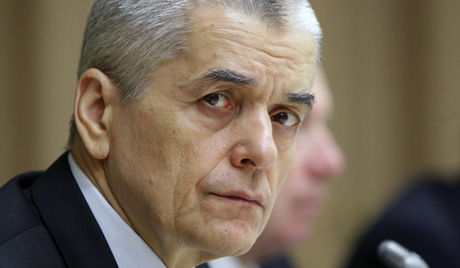
Georgia Once Again Finds Russia To Be a Bad Negotiating Partner
Publication: Eurasia Daily Monitor Volume: 10 Issue: 36
By:

On February 4, a Georgian delegation led by Levan Davitashvili, the head of the National Wine Agency at the Ministry of Agriculture, held another round of trade negotiations with Gennady Onishchenko, the head of the Russian state consumer agency Rospotrebnadzor. After the negotiations, the officials declared that the imports of Georgian wines and mineral waters to Russia could be allowed to resume by the end of this spring, at the latest. However, as Onishchenko stated, groups of experts from Rospotrebnadzor would visit Georgia within two weeks to inspect wine- and mineral water–producing factories (Georgian Public Broadcaster, Info 9, February 4). So far, no final trade agreement has been reached between Georgia and Russia. Negotiations are still largely ongoing.
Russia, citing quality and safety concerns, banned the imports of Georgian wines and mineral waters in spring 2006 (www.civil.ge, May 5, 2006) amid a Russian-Georgian spy row, in order to sabotage the Georgian economy (see EDM, March 28, 2006).
On February 25, 2013, incidentally on the day of the 92nd anniversary of Soviet Russia’s occupation of Georgia, three groups of Russian food sanitation experts, after some delay, arrived in Georgia to inspect 40 wine- and 4 mineral water–producing factories. The week-long inspection will decide which of about 60 to 80 companies will be given rights to export their products to Russia (www.commersant.ge, Vestnik Kavkaza, February 25). Certainly, such an approach leaves much room for arbitrary discrimination against certain undesirable companies.
Russian-Georgian trade negotiations provide Moscow with an inexpensive political chip in its relations with Tbilisi. On numerous occasions, various Russian experts enthusiastically advocated pushing Georgia into accepting more concessions and luring it back into Russia’s (economic and political) sphere of influence. This strategy appears to be working. The new Georgian government has already conceded a great deal to Russia, and the list of compromises is lengthening (see EDM, December 4, 2012).
Nevertheless, making concessions does not seem to help Georgia’s position vis-à-vis Russia. On February 4, after the negotiations, Onishchenko stated that the ban will be removed only on bottled wine, not on wine ingredients (grapes, first and foremost), to avoid the risk of counterfeiting Georgian wines within Russia. As Onishchenko declared, this issue can become the subject of future talks (RIA Novosti, www.civil.ge, February 4). Maintaining the ban on wine ingredients deprives thousands of Georgian grape growers—the group that would benefit the most from improved bilateral trade—the opportunity to gain from the reopening of the Russian market. Rather, they will find themselves constrained from exporting directly and independently to Russia. In other words, the reopening of the Russian market in its present negotiated form loses much of its sense for the largest segment of the Georgian agricultural sector—grape growers. The remaining ban on wine ingredients also gives additional leverage to Moscow to drag out negotiations and extract further concessions from Tbilisi. Negotiations on the resumption of imports of Georgian fruits and vegetables are also ongoing (www.gurianews.ge, February 6), leaving Russia with an additional source of pressure over Georgia.
To add insult to injury, during a television interview, Rospotrebnadzor chief Onishchenko was asked when Russians would again be able to taste real Georgian wine, to which he cynically responded that it could happen pretty soon if Georgians “were not as lazy as they have always been” (www.tvrain.ru, February 14). Moreover, Onishchenko, in a somewhat demeaning tone, declared that Georgian wines would occupy no more than four percent of the Russian market, which might be significant for Georgia, but insignificant for Russia (Kyiv Post; Rustavi 2, February 5). In fact, Onishchenko claimed that Russia was doing Georgia a favor. Earlier, Russian President Vladimir Putin made a similar statement, emphasizing that the resumption of Georgian imports would be insignificant for Russia, though it might be important for the Georgian economy (www.regnum.ru, December 20, 2012).
This estimation is simply not true. Even by the most optimistic prognoses, Georgian wine exports to Russia will not exceed $25 million annually (www.kvirispalitra.ge, February 11). Adding to this the money that could be generated by the exports of Georgian mineral waters, fruits and vegetables (which are not yet allowed to return to the Russian market), the value of Georgia’s exports to Russia cannot exceed $100–120 million per year, even in the best case scenario. Needless to say, this amount is insignificant to make much, if any, impact even on an economy as small as Georgia’s—whose GDP in 2012 was $15.8 billion. The expectations of this bilateral trade’s positive influence on the Georgian economy are being deliberately exaggerated. And they are exaggerated specifically by the Georgian government, for whom the resumption of Georgian-Russian trade has been the centerpiece of its rapprochement policy with Moscow. In other words, the Georgian government spreads unrealistic expectations about how much the reopening of Russian markets will aid the revival of the struggling Georgian economy. This certainly benefits Moscow, giving it extra leverage over Tbilisi.
Russia, as a World Trade Organization (WTO) member, is not allowed under the Most Favored Nation (MFN) rule (https://www.wto.org/english/thewto_e/whatis_e/tif_e/fact2_e.htm) to ban any WTO member’s—including Georgia’s—products from its own market, while allowing other members’ goods. Subsequently, Moscow was obliged under the MFN to resume Georgian imports without any complications. This is not what Russia is doing. While trade negotiations drag on, Georgia finds itself making more and more concessions to Moscow. In the process, what Georgia is acquiring is not a new export market, but an unreliable trading partner, which Russia has proved itself to be on multiple occasions not only with Georgia, but with many others, including European Union countries.




